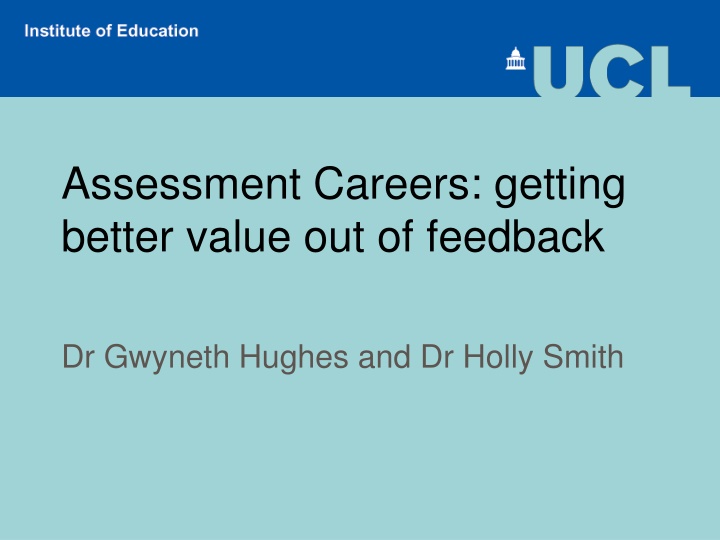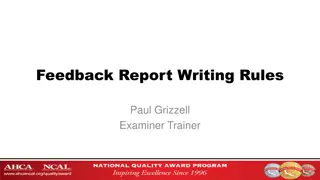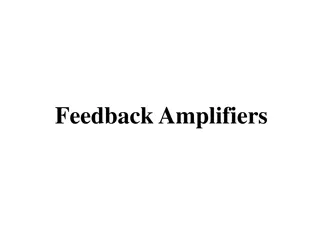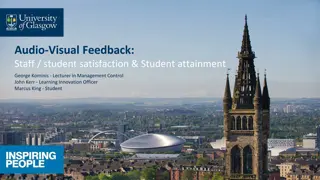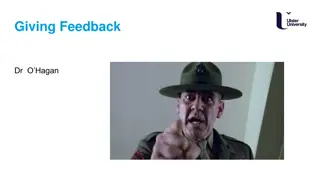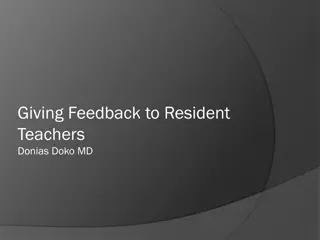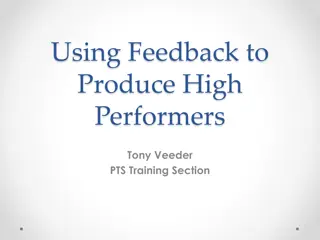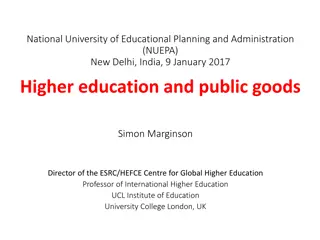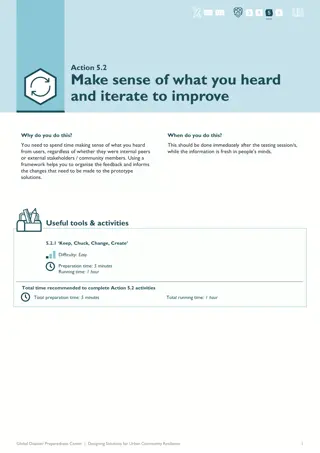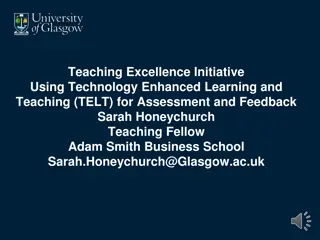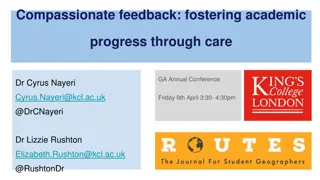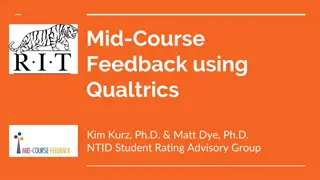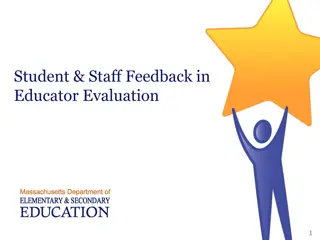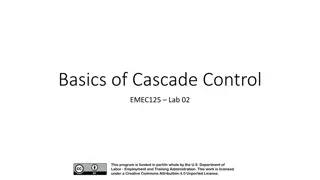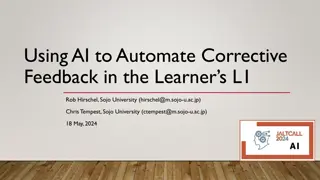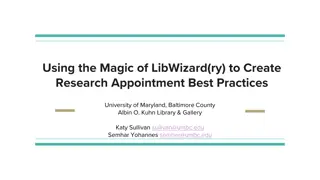Enhancing Feedback Practices in Higher Education
Exploring issues and solutions related to feedback in higher education, this content discusses challenges faced by students and educators. It emphasizes the importance of constructive feedback and suggests the use of feedback response forms for both formative and summative assessments to enhance student learning outcomes.
Download Presentation

Please find below an Image/Link to download the presentation.
The content on the website is provided AS IS for your information and personal use only. It may not be sold, licensed, or shared on other websites without obtaining consent from the author.If you encounter any issues during the download, it is possible that the publisher has removed the file from their server.
You are allowed to download the files provided on this website for personal or commercial use, subject to the condition that they are used lawfully. All files are the property of their respective owners.
The content on the website is provided AS IS for your information and personal use only. It may not be sold, licensed, or shared on other websites without obtaining consent from the author.
E N D
Presentation Transcript
Assessment Careers: getting better value out of feedback Dr Gwyneth Hughes and Dr Holly Smith
Assessment Careers Project: a response to modularisation Year 1: 2011/12 Baseline reporting and feedback analysis Year 2: 2012/13 Five pilot programmes Year 3: 2013/14 Institutional implementation Assessment Careers: Institute of Education website: www.ioe.ac.uk/assessmentcareers and video clip.
Some current issues with feedback in HE Feedback rarely scrutinised, when it is practice is inconsistent Lack of learner engagement with and understanding of feedback (Lizzio & Wilson, 2008) Inefficiency in terms of effort and impact Transmitted feedback creates dependency on teacher (Carless et al. 2011)
Praise is not helpful to students unless accompanied by detail on why the praise is deserved. Encourages dependency on others (Hattie & Timperley, 2007). Praise-critique does not encourage dialogue and self- reliance (Nicol & Macfarlane-Dick, 2005) Lack of information about progress but this could be motivating (Hughes, 2011) Critique and advice are for the current assignment. Encourages focus on short-term grade improvement rather than longer-term learning. 4
What do students do with feedback? Formative n=50 Summative n=35 didn't respond to the question 4 3 no feedback received 1 nothing 4 5 read 3 10 revised assessment 32 3 systematically took forward 7 13
A solution? Formative feedback response forms Summative feedback response forms To be submitted with an assignment
Formative Student Feedback Response Forms What did you do well in this assignment? What could be improved? Is there anything you specifically want feedback on?
Summative Student Feedback Response Forms Thinking about the feedback on your draft assignment, please indicate what the key points were. For each point state what action you took to respond to this feedback in preparing the final version of your assignment.
Pilot reports on using Student Feedback Response Forms Generally positively received by staff, but concerns over increased workload Student use of Student Feedback Response Forms in pilots was patchy, and response to them mixed. Some thought it was their tutor s role to decide what they needed feedback on. Some found them a helpful prompt. Some were already spontaneously self-assessing in covering emails with draft work and asking for feedback.
Student responses I like being able to ask the tutor quite directly the area that need work and [what] to focus on (MRes student) Particularly as I'd taken a long break between this and the previous module so it actually made me go back and consider feedback from earlier assignments.(MA in Health Education student) I just created a list of the things that I changed and it didn t take me long but I did do it after I d changed everything, I didn t do it as I went along. I thought it was more of an exercise I m going to hand my essay in and I need to do this. (PGCE student)
Staff responses I found it easier but not necessarily quicker to provide the feedback because I had a sense that I was providing feedback to someone about something rather than on a piece of written work... it brought it to life in some way. I have endeavoured to be still more specific about what the student should change to further improve their assignment and in giving examples about how they might change the assignment in this way. (PGCE tutor) It seemed that many students needed to be taught how to use feedback, what it could be for, and the role it could play in the learning process.(MRes tutor)
Institutional dissemination 24 new programmes or teams given details of the student response form or have implemented the form
Assessment Literacy Student responses depend on what they are being asked to do, how it is introduced by tutors, and their capacity to engage with the process = Assessment Literacy We recommend: Asking students what they have done with feedback is more effective than asking them what they want feedback on Tutor commitment to a dialogue about assessment is essential For a feedback dialogue explain to students that this an educational not admin task
References Carless, D. Slater, D. Yang, M. & Lam, J. (2011) Developing sustainable feedback practices. Studies in Higher Education,36(4) 395-407. Gibbs, G. & Simpson, C. (2004) Conditions Under Which Assessment Supports Students Learning. Learning and Teaching in Higher Education, 1, 3-31 Hattie, J. & Timperley, H. (2007) The Power of Feedback. Review of Educational Research ,77(1) 81-112. Hughes, G. (2011) Aiming for Personal Best: a Case for Introducing Ipsative Assessment in Higher Education. Studies in Higher Education ,36(3), 353 367. Hughes, G., Smith, H., & Creese, B. (2015). Not seeing the wood for the trees: developing a feedback analysis tool to explore feed forward in modularised programmes. Assessment & Evaluation in Higher Education, 40(8), 1079 1094. Nicol, D. & Macfarlane-Dick, D. (2006) Formative assessment and self-regulated learning: a model and seven principles of good feedback practice. Studies in Higher Education, 31(2), 199-218. Orsmond, P. & Merry, S. (2011) Feedback alignment: effective and ineffective links between tutors and students understanding of coursework feedback. Assessment & Evaluation in Higher Education, 36(2), 125-126.
